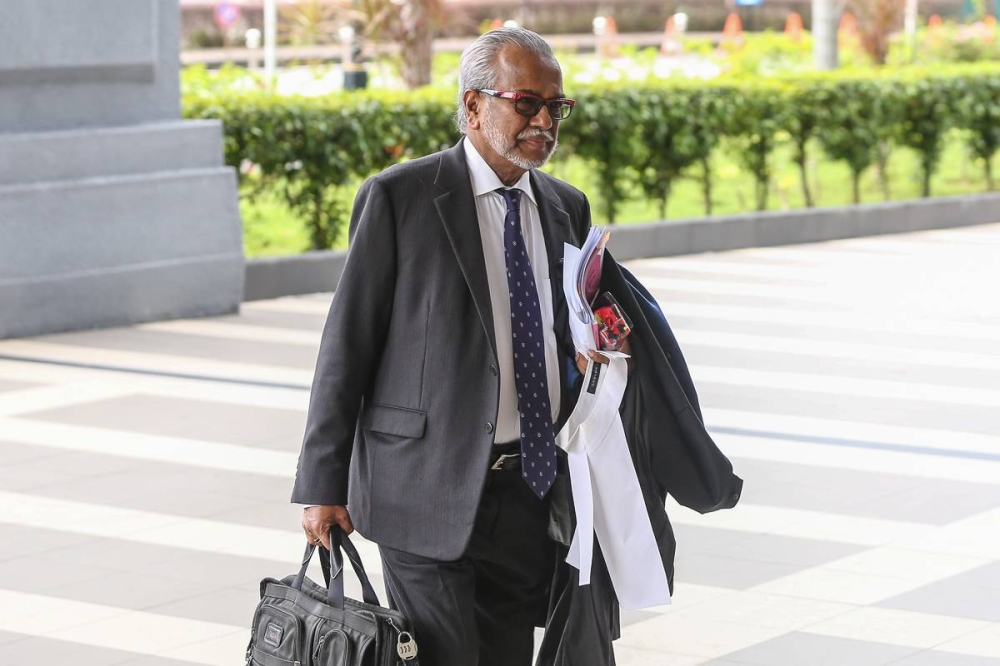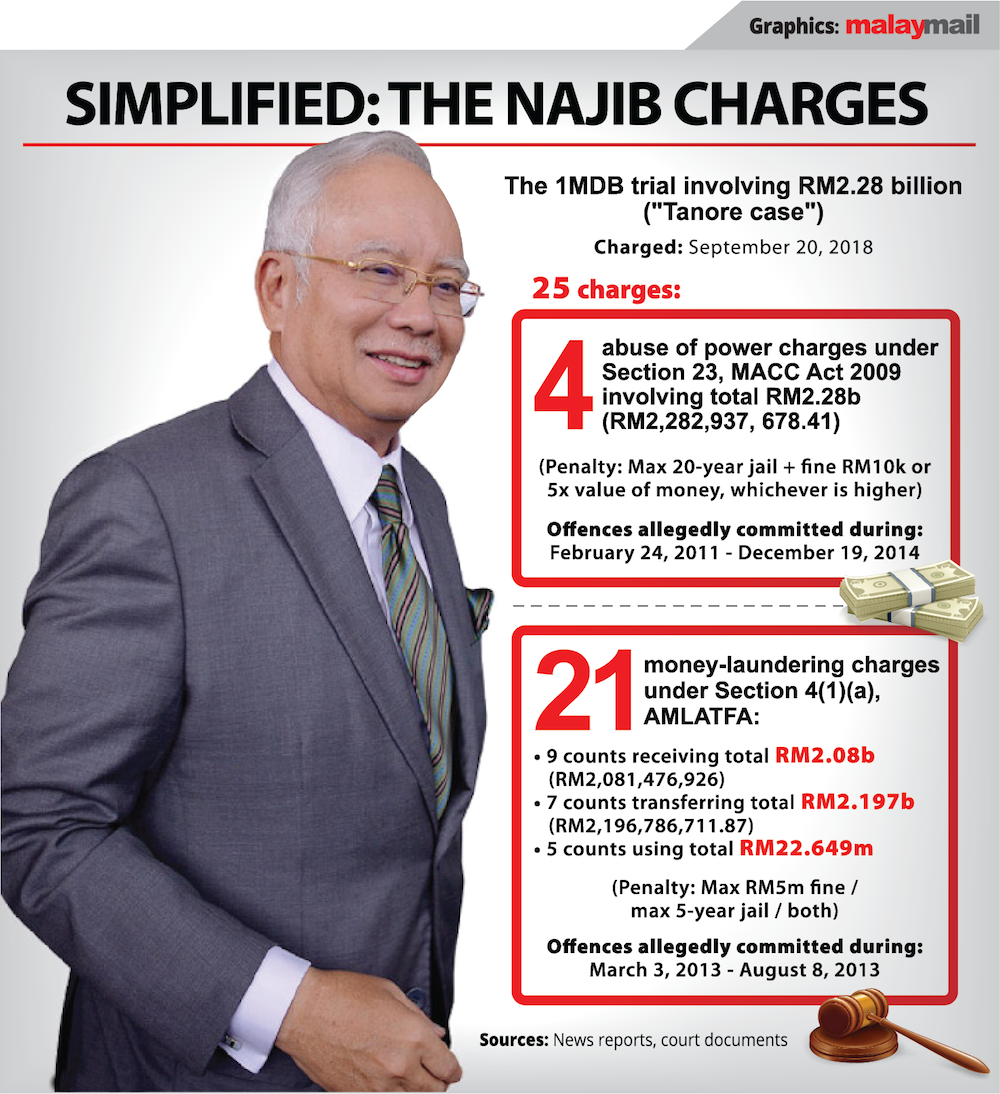KUALA LUMPUR, Dec 15 — The four letters by a purported Saudi prince allegedly promising huge donations to then prime minister Datuk Seri Najib Razak are all “worthless” documents, Datuk Seri Gopal Sri Ram told the High Court today.
Sri Ram, who is the lead prosecutor in Najib’s 1Malaysia Development Berhad (1MDB) trial, pointed out that these letters were found to be fabricated by judges in a separate criminal trial involving Najib.
In the 1MDB trial, Najib is facing 25 charges over the alleged misappropriation of more than RM2.28 billion of 1MDB funds which were said to have entered his private bank accounts at AmBank. Najib has however claimed that these funds were donations to him from Saudi Arabia’s royalty.
Najib’s legal team had yesterday tried to have the four letters — an important part of his Saudi donation claim — marked as evidence in the 1MDB trial.
But Sri Ram today objected to these four letters from being accepted as evidence in the 1MDB trial, as he pointed out that judges in Najib’s separate SRC International Sdn Bhd trial had found these purported Saudi donation letters to be a “fabrication”.
Sri Ram then proceeded to read out excerpts from the High Court and Court of Appeal’s judgments in Najib’s SRC trial. Najib had been found guilty over the misappropriation of SRC’s RM42 million and lost his appeals at the Court of Appeal and Federal Court, which resulted in him currently serving his 12-year jail term.
With the High Court judge in the SRC case having found Najib’s key defence following the four Arab letters of believing the foreign funds entering his accounts were personal donations from the Saudi ruler to be “contrived and a fabrication”, Sri Ram pointed out that Najib’s attempt to bring in those letters as evidence in the 1MDB trial would be an “exercise in futility”.
“It would produce no result for the defence because it has already been found to be a fabrication,” he argued, adding that the Court of Appeal had affirmed this by noting that the letters’ authenticity had not been established and its contents were inadmissible hearsay.
“So if they have already been held to be worthless documents at two levels and affirmed by decision of the apex court, we respectfully submit that the court should not act in vain by giving the accused in the present case the leeway of putting in the letters,” he said, adding that the previous findings by the other courts of the four letters being a “fabrication” would be binding on the High Court in the 1MDB trial.
Sri Ram pointed out that the High Court, Court of Appeal and Federal Court in the SRC case had given “zero weight” to the four purported Saudi donation letters, also highlighting that the Court of Appeal had agreed in the SRC case that the Arab donation story is a “concoction” that lacks “any credibility”.
But if the High Court in the 1MDB trial were to allow these four letters to be marked as evidence, Sri Ram said these letters should only be marked as documents that were received by AmBank and not marked as evidence which have been established to be true or authentic.
Sri Ram said the High Court in the 1MDB trial could later on carry out a critical analysis of these four documents, but continued to insist that Najib will not be able to use these four letters to defend himself over the RM2.28 billion as other courts had found them to be a fabrication.

Najib’s lead defence lawyer Tan Sri Muhammad Shafee Abdullah noted that AmBank’s former banker Joanna Yu would not be able to confirm the truth of the contents of the four letters.
But Shafee argued that the four letters should be admitted as evidence as AmBank had not only received and acted on them, but that the bank had also allegedly made Bank Negara act on them.
Ultimately, Shafee agreed that the four letters could be marked as documents which had been received by AmBank, but without having them marked as evidence which had been proven to be true.
But Shafee also objected to Sri Ram’s argument that the High Court in the 1MDB trial would be bound and would have to also find that the four letters were fabricated due to the SRC case decisions at the High Court and Court of Appeal.
Shafee noted that past court cases state that an issue which had already been decided in favour of an accused person at the highest court will not be allowed to be relitigated or to be pursued again in court, but said this rule does not apply when the accused person is trying to maintain a defence.
“The prosecution here is saying cut off their foot and their knees so that they can’t walk and they can’t do their defence, that’s what they are saying,” Shafee claimed as an analogy regarding the prosecution’s arguments on the four letters.
“Because Yang Arif will note these documents are one of the very basis of lack of knowledge. If they say this cannot be admitted because it has been decided in another case, what is the use of this trial? You are basically saying this entire defence has been chopped off, my client might as well plead guilty,” he said, and asked to be allowed to present further arguments on this point.
Finally, after hearing both sides, High Court judge Datuk Collin Lawrence Sequerah in the afternoon recorded the agreement by both the prosecution and Najib’s legal team to have the four purported “donation” letters marked as exhibits, “merely for the purpose of establishing that the documents exist and the bank had received them.”
The judge also said he will decide on the truth of the contents of the four letters at a later stage.
Najib’s 1MDB trial will resume on January 27, with Shafee expected to continue cross-examining former AmBank banker Joanna Yu as the 41st prosecution witness in this trial.























